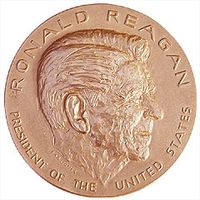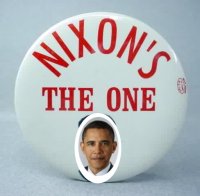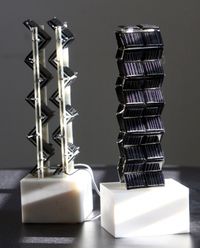Think of this as Volume 18, Number 41 of the newsletter I have written weekly since March, 1997. Enjoy.

His subject was the Cold War. He wrote that John F. Kennedy talked the language of soft power but mainly engaged in hard power, the use of military force, while Ronald Reagan talked the language of hard power while mainly using soft power, diplomacy and economic pressure.
Much of what Reagan accomplished was obscured by his stupidities, like the Iran-Contra scandal. But one thing he did do was convince the Saudis to increase production and tank the price of oil, which fell to as low as $10/barrel in 1986.
This gave the Saudi family far more influence in regional and global affairs, which is something we’re still dealing with. But it also strangled the Soviet Union and helped bring it down. Lower oil prices also collapsed gold and diamond prices throughout the decade, eliminating the party’s means of acquiring foreign exchange and keep itself afloat. The final collapse became inevitable.

Once again, the Saud family is in the oil market’s driving seat. Once more, they’re hitting the accelerator in order to damage regional and global foes. The 20% drop in oil prices has hurt Iran, which is its main rival for influence over Iraq and Syria. The drop has also hurt Vladimir Putin, and the Russian economy is now circling the drain for the same reasons it did 30 years ago.
The fall in oil prices has also hurt Obama’s main rivals for power in the U.S., the oil barons. Our recovery has mainly been driven by rising oil production, and the producers are giving the Administration no credit for that. On the contrary, oil barons like the Koch Brothers have been spending hundreds of millions of dollars to take back the Congress and, by 2016, the White House.

Consider. First you strip mine bitumen from the soil. Then you truck it to a processing plant where it’s crushed, heated, and combined with natural gas liquids to form a slurry that can, after a fashion, be refined into gasoline and other products.
Every step of the process is environmentally horrendous. Strip-mining the land, burning what comes up, and shipping it out – often by rail – would not be possible if the producers had to pay the carbon costs of what they’re doing. Fact is they don’t. But even with that, the margins they can get on what they’re producing are fairly thin. They take a discount of anywhere from $10-15/barrel off West Texas oil prices, then pay another $10/barrel to transport the stuff to a refinery, where it’s “cracked” – heated so that it separates into components – and then carried off in pipelines to market.
The raw energy cost of all this is tremendous. There’s gasoline for the trucks and the bulldozers. There’s the natural gas used to process the stuff. There’s the diesel fuel used in the trains. There’s more natural gas used by the refinery. The brothers claim they’re “creating energy” – really? Not really. They’re spending energy to create something that can be burned using existing transportation infrastructure. That’s different.
The point is, lower oil prices erode the margins on Alberta tar sands down to nothing. Because the Keystone XL pipeline, which was supposed to take this stuff directly to Houston refineries at about $2/barrel, has not yet been built (thanks Obama), they’re paying $10/barrel to get it out by rail. It adds up.
Any wonder the brothers hate Obama? Any other reason why you shouldn’t love the man?

These technologies continue to proceed nicely. Graphene could solve the storage problem. New materials may increase the efficiency of solar panels, and at lower cost. New designs are increasing the efficiency of wind turbines, and making them safer for birds as well.
Renewable costs are declining. Fossil fuel costs are not. That’s the bottom line. The degree to which this change helps or hurts the U.S. – the depth of the next recession – depends on just how dependent we are on revenues from oil when demand starts falling and the cost of renewables falls decisively below that of fossil fuel alternatives, without subsidy.
I don’t think the Saudis would be so anxious to manipulate world events, using their oil, which after all is finite, if they really didn’t believe this point in time weren’t approaching like a freight train. Anyone who claims it’s not is selling you something. Don’t buy it.
The Sun will continue to shine, the wind will continue to blow, the crops will continue to grow, and we still live on a molten rock. Harnessing this abundance is the great task of our time, and nothing is going to stop it.









